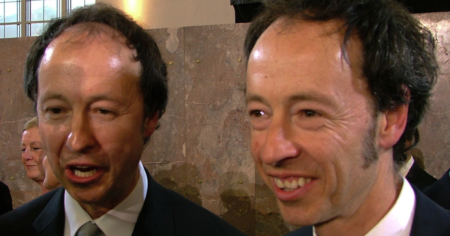Ferdinand Berthier was a pivotal figure in the history of deaf education, advocacy, and culture. Known for his contributions as an educator, writer, and advocate, Berthier’s legacy continues to inspire the deaf community and beyond. This essay delves into his life, achievements, and lasting impact on deaf education and rights.
Early Life and Background
Ferdinand Berthier was born on September 30, 1803, in Louhans, France. From an early age, Berthier was deaf, a condition that would shape his life’s work and mission. He was fortunate to grow up in a time when attitudes towards the deaf community were beginning to shift, thanks in part to the efforts of early pioneers like Abbé de l’Épée, who had established the first school for the deaf in Paris in the late 18th century.
Berthier’s own education began at the National Institute for Deaf-Mutes in Paris, one of the first institutions of its kind, where he was taught using sign language. This was a formative experience for Berthier, who thrived in this environment and quickly demonstrated his potential. He became deeply influenced by the values of the Enlightenment, which emphasized education, human rights, and the potential for all individuals to contribute meaningfully to society.
Biography Table of Ferdinand Berthier
| Attribute | Details |
| Full Name | Ferdinand Berthier |
| Date of Birth | September 30, 1803 |
| Place of Birth | Louhans, France |
| Deaf Status | Deaf from an early age |
| Education | National Institute for Deaf-Mutes, Paris |
| Occupation | Educator, Writer, Advocate |
| Notable Roles | Teacher at the National Institute for Deaf-Mutes, Founder of Société Centrale des Sourds-Muets |
| Major Contributions | Advocacy for deaf rights, promotion of sign language, literary works on deaf culture |
| Awards | Chevalier of the Légion d’Honneur (1849) |
| Death | July 12, 1886 |
| Legacy | Pioneer in deaf education and advocacy, promoter of sign language as a vital part of deaf culture |
Becoming an Educator and Leader
After completing his education, Berthier was determined to help other deaf individuals receive the same opportunities that had been afforded to him. In 1829, he joined the faculty of the National Institute for Deaf-Mutes as a teacher. He was one of the first deaf people to teach at the institute, breaking barriers and challenging societal perceptions of what deaf individuals could achieve. His presence as a deaf educator was revolutionary, serving as both a role model and a beacon of hope for his students.
Berthier quickly became known for his innovative teaching methods, which emphasized the importance of sign language as a natural and essential mode of communication for the deaf. Unlike many of his contemporaries who promoted oralism—the practice of teaching deaf students to speak and read lips—Berthier was a staunch advocate of sign language, which he saw as a legitimate language and cultural cornerstone of the deaf community.
Advocacy for Deaf Rights and Culture
Beyond the classroom, Berthier was a tireless advocate for the rights and recognition of the deaf community. He believed that deaf people should have the same rights and opportunities as hearing individuals, including access to education, employment, and participation in civic life. To this end, Berthier dedicated himself to elevating the status of the deaf community within society.
One of Berthier’s most significant contributions was his work in organizing the first official gatherings of deaf people in France. In 1834, he helped to establish the Société Centrale des Sourds-Muets (Central Society of Deaf-Mutes), a groundbreaking organization that aimed to bring deaf individuals together to share ideas, foster community, and advocate for their rights. This society became a powerful platform for advancing deaf culture and sign language, offering a space where deaf people could connect and collaborate.
Berthier also played a key role in organizing annual banquets to honor Abbé de l’Épée, which became a major event in the deaf community. These banquets were not only social gatherings but also political statements, highlighting the achievements of deaf individuals and advocating for the recognition of their rights.
Literary Contributions and Public Recognition
Ferdinand Berthier was also an accomplished writer and intellectual. He authored several books, essays, and articles that championed the cause of deaf education and sign language. His works, such as “Les Sourds-Muets: Considérés Sous le Rapport de Leur Éducation” (The Deaf-Mutes: Considered in Relation to Their Education), provided a critical analysis of the state of deaf education and called for reforms that would respect the linguistic and cultural identity of the deaf community.
Through his writings, Berthier sought to educate the broader public about the capabilities and potential of deaf individuals. He challenged prevailing misconceptions and prejudices, arguing that deaf people were just as capable of intellectual and artistic achievement as their hearing counterparts. His literary contributions were widely read and respected, bringing greater visibility to the deaf community and its unique language and culture.
In recognition of his work, Berthier was honored by the French government in 1849 with the title of Chevalier of the Légion d’Honneur, making him the first deaf person to receive this prestigious award. This recognition was a significant milestone, not only for Berthier but also for the entire deaf community, symbolizing a growing acknowledgment of their contributions to society.
Challenges and Opposition
Despite his many achievements, Berthier faced significant challenges and opposition throughout his life. The rise of oralism in the mid-19th century posed a direct threat to the deaf community’s use of sign language. Proponents of oralism believed that teaching deaf children to speak and lip-read would better integrate them into hearing society, often at the expense of sign language.
Berthier vehemently opposed this movement, arguing that it marginalized deaf culture and denied deaf individuals a crucial aspect of their identity. He maintained that sign language was not only a tool for communication but also a rich and expressive language in its own right. His advocacy for sign language put him at odds with many educators and policymakers of his time, but Berthier remained steadfast in his beliefs.
Legacy and Impact
Ferdinand Berthier’s legacy is profound and enduring. As an educator, he inspired countless deaf students to pursue their potential, fostering a sense of pride and identity within the deaf community. His work in advocating for deaf rights helped to lay the groundwork for future generations of activists who would continue the fight for equality and recognition.
Berthier’s commitment to sign language and deaf culture has had a lasting impact on the field of deaf education. Today, sign language is widely recognized as a vital component of deaf identity, and there is greater awareness of the need to respect and preserve this unique cultural heritage. Modern deaf education often embraces bilingual approaches, incorporating both sign language and spoken language, a testament to the principles that Berthier championed.
Moreover, Berthier’s life and work serve as a reminder of the importance of representation and advocacy. As one of the first deaf educators and public intellectuals, he broke down barriers and opened doors for future generations. His story is not just about the achievements of one man but about the resilience and potential of an entire community.
Conclusion
Ferdinand Berthier was a trailblazer whose work transformed the landscape of deaf education and advocacy. From his pioneering role as an educator to his tireless efforts to promote deaf rights and culture, Berthier’s contributions have left an indelible mark on history. His legacy continues to inspire those who advocate for a world where the rights, culture, and language of all individuals, regardless of their abilities, are respected and celebrated. Through his life’s work, Ferdinand Berthier has ensured that the voices of the deaf community will never be silent.









